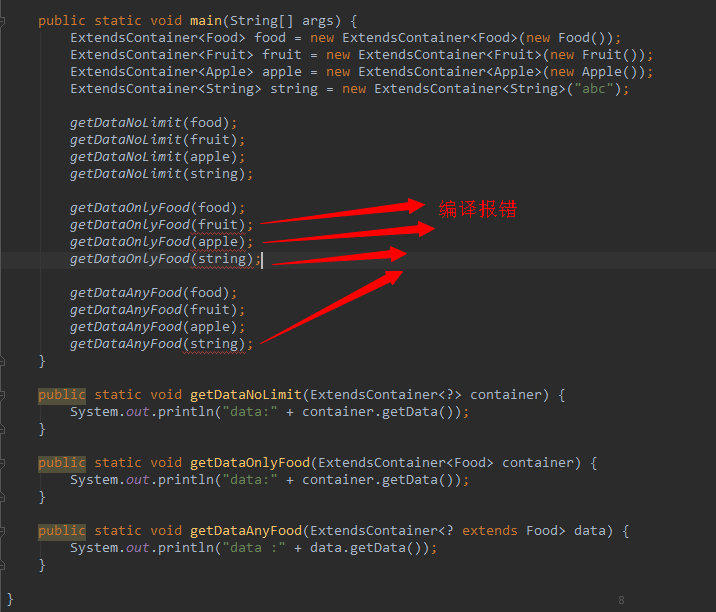版权声明:本文为博主原创文章,未经博主允许不得转载。 https://blog.csdn.net/aitangyong/article/details/54932183
本文主要参考下面几篇文章:
http://blog.csdn.net/seu_calvin/article/details/52230032
http://blog.csdn.net/orzlzro/article/details/7017435
http://sharewind.iteye.com/blog/1622164
https://www.zhihu.com/question/20400700
1、 泛型类(接口)的写法以及继承
// 类似java.util.function.Function
public interface GenericInterface<T, R> {
public R apply(T t);
}
// 类似java.util.stream.IntStream
public interface InheritGeneric0 extends GenericInterface<String, Integer> {
}
// 类似java.util.function.UnaryOperator
public interface InheritGeneric1<T> extends GenericInterface<T, T> {
}
// 类似java.util.HashMap
public interface InheritGeneric2<T, R> extends GenericInterface<T, R> {
}
// JDK库尚未找到类似的
public interface InheritGeneric3<V, T, R> extends GenericInterface<T, R> {
public V apply2(T t, R r);
}2、泛型方法的写法
public class Retryer<T> {
private T value;
private int id = 0;
public Retryer() {
}
public Retryer(int id) {
this.id = id;
}
public T getValue() {
return value;
}
public void setValue(T value) {
this.value = value;
}
public int getId() {
return id;
}
public void setId(int id) {
this.id = id;
}
}
// 泛型的声明:方法的修饰符(public,static,final,abstract等)之后, 返回值(void,int等)之前
public class SpecificClass {
// 入参泛型,返回值非泛型
public <L, R> int sum(L[] left, R[] right) {
return left.length + right.length;
}
// 入参非泛型,返回值泛型
public static <T> Retryer<T> build() {
return new Retryer<T>();
}
// 入参泛型,返回值泛型
public <L, R, V> Retryer<V> buildLength(L[] left, R[] right) {
return new Retryer<V>(left.length + right.length);
}
// 限制泛型: 只能是某个类的子类或者只能是实现了某些接口的类
// <T extends Comparable>
// <T extends Number&Serializable>
// <T extends Comparable&Serializable>
public <L extends Number, R extends Number> double add(L left, R right) {
return left.doubleValue() + right.doubleValue();
}
}3、泛型的一些基本特性:不能实例化对象和数组
import java.lang.reflect.Array;
import java.lang.reflect.Method;
import java.util.ArrayList;
import java.util.List;
public class GenericBasicFeature {
public static void main(String[] args) {
test1();
String[] stringArray = (String[]) Array.newInstance(String.class, 5);
System.out.println("stringArray.length=" + stringArray.length);
String[] stringArray2 = GenericBasicFeature.test2(5, String.class);
System.out.println("stringArray2.length=" + stringArray2.length);
}
// 泛型只在编译期有效
// http://blog.csdn.net/seu_calvin/article/details/52230032
public static void test1() {
List<String> stringList = new ArrayList<String>();
stringList.add("aaa");
// 编译报错
// stringList.add(new Object());
// 运行时通过反射添加元素
try {
Class clazz = stringList.getClass();
Method method = clazz.getMethod("add", Object.class);
method.invoke(stringList, 100);
} catch (Exception e) {
e.printStackTrace();
}
// [aaa, 100]
System.out.println(stringList);
}
// java不支持创建泛型数组
// http://blog.csdn.net/orzlzro/article/details/7017435
public static <T> T[] test2(int length, Class<T> newType) {
// T t = new T(); 编译错误
// T[] wrong = new T[length]; 编译错误
// T[] newArray = (T[]) new Object[length]; 运行时ClassCastException
// 参考Arrays.copyOf
T[] newArray = (T[]) Array.newInstance(newType, length);
return newArray;
}
}4、泛型的super和extend的PECS原则
// PECS(Producer Extends Consumer Super)
public class Demo {
static class Food {
}
static class Fruit extends Food {
}
static class Apple extends Fruit {
}
public void testExtend() {
List<? extends Food> flist = new ArrayList<Food>();
flist.add(new Apple()); //compile error
flist.add(new Fruit()); //compile error
flist.add(new Object()); //compile error
Food fruit = flist.get(0); //ok
}
public void testSuper() {
List<? super Food> flist = new ArrayList<Food>();
flist.add(new Food()); //ok
flist.add(new Fruit()); //ok
flist.add(new Apple()); //ok
Food f = flist.get(0);// compile error
}
}public class ExtendsContainer<T> {
private T data;
public ExtendsContainer(T data) {
this.data = data;
}
public T getData() {
return data;
}
public void setData(T data) {
this.data = data;
}
}
public class Demo {
static class Food {
}
static class Fruit extends Food {
}
static class Apple extends Fruit {
}
public static void main(String[] args) {
ExtendsContainer<Food> food = new ExtendsContainer<Food>(new Food());
ExtendsContainer<Fruit> fruit = new ExtendsContainer<Fruit>(new Fruit());
ExtendsContainer<Apple> apple = new ExtendsContainer<Apple>(new Apple());
ExtendsContainer<String> string = new ExtendsContainer<String>("abc");
getDataNoLimit(food);
getDataNoLimit(fruit);
getDataNoLimit(apple);
getDataNoLimit(string);
getDataOnlyFood(food);
getDataOnlyFood(fruit);
getDataOnlyFood(apple);
getDataOnlyFood(string);
getDataAnyFood(food);
getDataAnyFood(fruit);
getDataAnyFood(apple);
getDataAnyFood(string);
}
public static void getDataNoLimit(ExtendsContainer<?> container) {
System.out.println("data:" + container.getData());
}
public static void getDataOnlyFood(ExtendsContainer<Food> container) {
System.out.println("data:" + container.getData());
}
public static void getDataAnyFood(ExtendsContainer<? extends Food> data) {
System.out.println("data :" + data.getData());
}
}